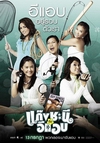Anyway, let's talk about the film. My first impression is that these five women are loud
 and the world would be a better place without them. Erm ... I'm just joking. I just felt we're now at last able to tackle the issue of sexuality in a frank, funny way. But the film is still predominantly melodramatic -- they tend to overplay emotion and downplay the complexity of gender construction. The messages are very strong and easy to grasp -- friends last longer than lovers; women sometimes marry 'gay' men by accident; and people fall in love happily on Loy Kratong Day. (The last one being just plain awkward and excessive, it simply should be cut from the film.)
and the world would be a better place without them. Erm ... I'm just joking. I just felt we're now at last able to tackle the issue of sexuality in a frank, funny way. But the film is still predominantly melodramatic -- they tend to overplay emotion and downplay the complexity of gender construction. The messages are very strong and easy to grasp -- friends last longer than lovers; women sometimes marry 'gay' men by accident; and people fall in love happily on Loy Kratong Day. (The last one being just plain awkward and excessive, it simply should be cut from the film.)However, it does make me wonder. Is being gay something one is born with, or is it constructed by society? Why cannot Kong get married to Pang at the end and reshape his sexuality? Or is it possible that there's this essence of being gay in there waiting to be discovered? And once one 'discovers' (rather than 'invents') this 'true' self, one needs to express it accordingly out of sincerity. I don't think there's an accurate answer to this, but it has long been pestering me. Even though I'd like to be persuaded by the constructivist view of sexuality, that sexuality is something created and categorised by society, somehow I feel a bit ill at ease. Maybe one's gender is shaped by society and this process is too effective and successful, as one feels like gender is something that one imposes upon oneself by choice. Maybe it all starts with an arrangement of DNAs and society further imposes some sort of pigeonholing and stereotyping, creating pattern that imprisons rather than liberates humans.
Anyway, constructivist or not, I believe the film somehow plays upon an all too facile view of sexuality -- that it is something that waits to be discovered, that Kong's gayness is like Pat's gayness or Pee Bee's gayness. The film also suggests that there're also signals that can tell whether one is gay or not. I don't believe this and I think the level of 'gayness' in all 'gay' people is different, to the extent that labelling someone as gay becomes some sort of violence, of putting someone in Jameson's 'prisonhouse of language'. Maybe Kong is what society brands 'gay' but what if he truly loves Pang and wants to settle down together. If so, what Pang's friends do (i.e. asking Kong's male ex-lover to rekindle his homosexual desire) is really terrible. In a way, I somehow wish that Pang and Kong decide to get married in the end, despite the protest of their friends. It's not the question of fooling oneself, but rather it's a question of willing to 'perform' one's gender and stick to it.
I also got a friend who is married to a rather 'gender-dubious' guy. They've been married for years but they are still very much in love. Well, at first our group had a big discussion but at the end we came to a conclusion that it's not the point. The point is whether he really 'loves' her and whether he's willing to share the rest of his life with her. Maybe there're more to life than just labelling and branding ...

1 comment:
Hello Pink! What a surprise to see you in this virtual reality. I've added your blogspot to my link. Hope this is OK.
Post a Comment